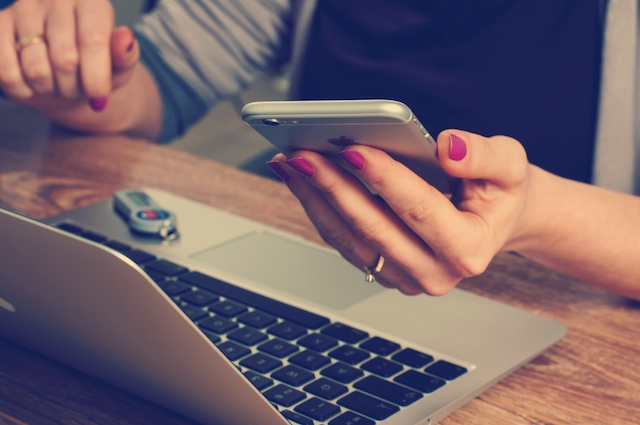
“You will never reach your destination if you stop and throw stones at every dog that barks.” ~ Winston S. Churchill
I caught a reflection of all four of us texting instead of enjoying what was our last family dinner in a gorgeous restaurant, the night before my son flew out to his university.
I was ashamed and angry with myself, feeling hypocritical for scolding my daughter just a few days ago for not focusing on her homework, instead of doing it while sending instant messages to her friends and listening to music.
Yet, here I was complicit in ruining what should have been a nice evening—all because the smartphone had somehow deceived me into believing that I could do several things at the same time.
Multitasking, and in particular the smartphone, is now a fundamental part of life—we are comfortable texting while we’re walking across the street, and we catch up on email while stopping at traffic lights. And worst of all we check on our virtual friends using Facebook, Twitter or Snapchat while having a face-to-face lunch with our real friends.
What is multitasking? It is when we attempt to complete one task, which needs some critical thinking or focused effort, while we are doing another equally important activity—or think we think we are. For example, listening to an important presentation while reading email, believing we won’t miss anything crucial from either.
This is entirely different from doing two things at the same time without needing much focus, like walking and talking or driving and listening to music.
Technology and specifically the smartphone is probably the single biggest contributor to the rise of the multitasking phenomena in our lives today. There are no clear boundaries now as work, rest and play all battle for our wakeful minutes.
There are many advantages to the smartphone and all the new technologies available, not least of all that we can access information no matter where we are. We can connect to people and places no matter where we find ourselves.
The dangers of multitasking and the abuse of the smartphone is being exhaustively studied in top universities around the world by top neuroscientists from Stanford to UCLA. The practice is ruining our lives and leading us to be disconnected, dissatisfied and ultimately leading us to an unfulfilled life.
Below are seven dangers of using a smartphone for multitasking.
1. Multitasking doesn’t work.
Multitasking simply doesn’t work and what we think is multitasking is only task-switching. Our brains are limited when it comes to attention and productivity and are set to complete one task at a time before moving onto the next one. As we switch rapidly from one task to another, we lose focus on both, our productivity suffers, and we limit our chances of getting fully “in the zone” where all magic resides.
Multitasking doesn’t save time, as it probably takes longer to finish two tasks when you’re jumping back and forth, than it would to complete each one separately.
2. It leads to mistakes and mediocrity.
We make many mistakes when switching tasks, causing almost 40 percent loss in productivity if critical thinking is required. Any new information learned while multi-tasking could go to the wrong part of the brain as the hippocampus, the part of the brain responsible for organizing information, is easily distracted.
Also, the prefrontal cortex burns up the same fuel—glucose that it needs for both switching tasks and staying on task. This then leads to the exhaustion of the required glucose levels in the brain, which in turn leads to mistakes and compromised work. It’s little wonder that we feel exhausted and disorientated after doing two tasks at the same time.
3. It could lead to stress and pain.
This repeated switching from task to task leads to anxiety, as we need to make lots of decisions. So when you stop your focus on a task to answer a call or email, you are then faced with making a decision, no matter how small it is.
This decision overload takes its toll on us, as it raises our heart rate and moves us from the restful-relaxed mode to the fight-or-flight mode. The brain now produces more adrenaline, and our brains are over stimulated causing mental fog. We become impulsive and start making bad decisions. This in turn raises levels of the stress hormone cortisol in the brain, which in turn can lead to serious stress and depression.
4. It could cause addiction.
Whenever we stop our focus on the project on hand and look at how many likes we have on Instagram, for example, we feel a sense of accomplishment. This creates a dopamine-addiction feedback loop, so our brains are being rewarded for losing focus and getting distracted.
5. It could cause memory loss.
When doing two things at the same time and both need our focus, in reality we are acting a bit like someone who’s drunk would. We feel that we’re taking in what is being said but in reality we can’t remember much or apply the knowledge we’ve learned.
6. We feel disconnected and miss out on life and relationships.
When doing two things at the same time, we are simply missing out on the beauty that life has to offer us. We don’t notice our surroundings or our environment. It’s like we are missing in action in our own lives—our eyes are open, and yet nothing is being registered in our brains.
How can we see the majestic oak trees in front of us, the seagulls flying in perfect unison above or the clouds forming artistically like paintings on canvas while taking a walk and texting.
We are losing our ability to interact and listen to each other as texting limits thoughtful discussion. We can’t truly hear each other’s stories as a few lines of text hardly compares to seeing and listening to the other person in front of us.
7. It dampens our creativity.
When we focus on one activity, like writing, there is a power in that; it helps guide us to organize our day around that responsibility. We have decided and prioritized it as our anchor task. This feeling of knowing what to do with an end result in mind helps us to focus all our efforts on a single task, and so our work is decidedly much better.
If you commit to nothing, you’ll be distracted by everything.
When you look at remarkable people who have left their mark on humanity by becoming masters of their craft, they all had one thing in common: focus and concentration.
Leonardo Da Vinci would spend months on a single project. And Steve Jobs, the inventor of the iPhone, which is probably the single biggest contributor to smartphone multitasking, was famous for his powers of focus and staying on one aspect of creativity for hours on end.
I want to be continually alive, and that requires me to eliminate all the noise that surrounds me, and all that impedes my connection to life.
I want to see the different seasons unveil right in front of my eyes, connect deeply with my loved ones and enjoy the small wonders that life tends to throw at us when we are mindfully present.
I don’t want to feel busy and productive but rather engaged in a meaningful life.
I want to be the master of my smartphone and don’t want it to become an obstacle to my growth and work.
Relephant:
How to Practice authentic Self-Care.
Author: Mo Issa
Editor: Catherine Monkman
Photo: William Iven/Unsplash
 Share on bsky
Share on bsky





Read 4 comments and reply